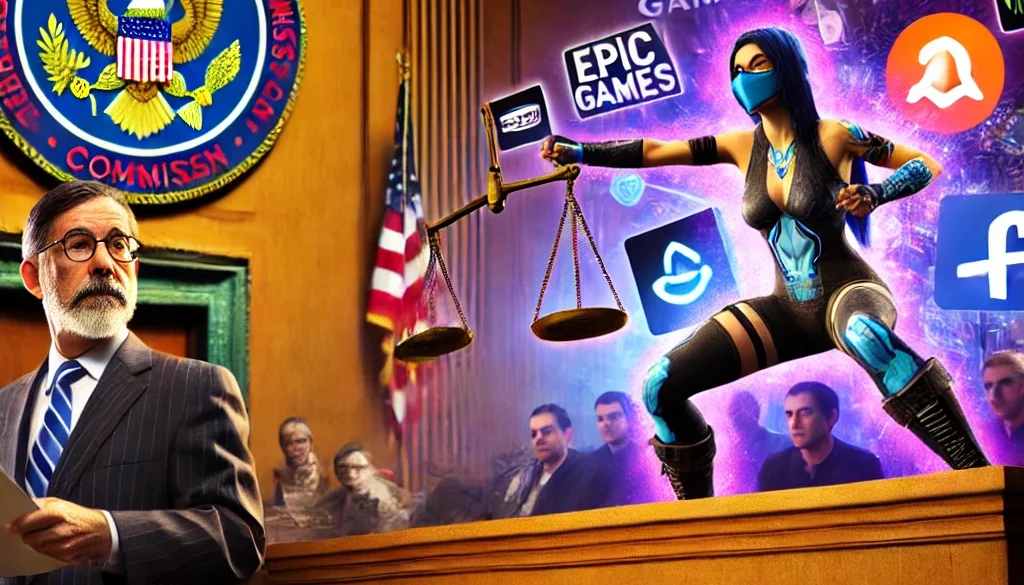The Epic Battle: FTC vs. Epic Games – A Legal Odyssey
Greetings, fellow gamers and legal enthusiasts! Daphne Benford-Smith here, your friendly neighborhood attorney specializing in video game law at Holon Law Partners. Today, we’re diving into the thrilling saga of the Federal Trade Commission (FTC) versus Epic Games, a case that has sent shockwaves through the gaming industry and beyond. Grab your popcorn, because this is an epic tale you won’t want to miss!
The Prelude: Setting the Stage
Our story begins with Epic Games, the mastermind behind the wildly popular game Fortnite. With its vibrant graphics, engaging gameplay, and a community of millions, Fortnite has become a cultural phenomenon. However, with great power comes great responsibility, and Epic Games found itself in hot water with the FTC over allegations of privacy violations and deceptive practices.
The Allegations: A Storm is Brewing
The FTC’s complaint against Epic Games was a doozy. The commission alleged that Epic violated the Children’s Online Privacy Protection Act (COPPA) by failing to obtain parental consent before collecting personal information from children under 13. Additionally, the FTC accused Epic of using “dark patterns” to trick players into making unintended purchases. These dark patterns included confusing button configurations and misleading interfaces designed to prompt accidental spending.
The Showdown: Legal Wrangling and Settlements
In December 2022, Epic Games agreed to a record-breaking settlement with the FTC, totaling a whopping $520 million. This settlement included a $275 million civil penalty for COPPA violations, the largest ever obtained for violating an FTC rule. The remaining $245 million was earmarked for consumer refunds related to the deceptive billing practices.
But the story doesn’t end there. The settlement also imposed several stringent requirements on Epic Games. The company must now obtain affirmative consent from parents before enabling voice and text chat for users under 13. Additionally, Epic is required to implement a comprehensive privacy program and undergo regular independent audits to ensure compliance.
Legal Considerations: The Present and Future
So, what does this mean for the gaming industry and beyond? Let’s break it down:
- Privacy Protections: The FTC’s action against Epic Games underscores the importance of robust privacy protections, especially for children. Companies must be vigilant in obtaining parental consent and safeguarding personal information. This case sets a precedent for stricter enforcement of COPPA and similar regulations.
- Transparency and Fair Practices: The crackdown on dark patterns highlights the need for transparency and fairness in digital transactions. Companies must ensure that their interfaces are clear and not designed to mislead consumers. This is a wake-up call for the industry to prioritize user experience and ethical design.
- Regulatory Scrutiny: The FTC’s aggressive stance signals increased regulatory scrutiny for tech companies. As digital markets evolve, we can expect more rigorous enforcement of consumer protection laws. Companies should proactively review their practices to avoid similar pitfalls.
- Future Implications: Looking ahead, this case could pave the way for new legislation aimed at protecting consumers in the digital age. Lawmakers may introduce stricter regulations to address emerging issues such as data privacy, cybersecurity, and digital marketing practices.
Trust and Safety: The Heart of the Matter
At the core of the FTC vs. Epic Games case lies a fundamental issue: trust and safety in the gaming industry. This case serves as a stark reminder that trust is the bedrock of any successful gaming platform. Players, especially young ones, need to feel safe and secure while engaging with digital content.
- Building Trust: By enforcing stringent privacy protections and transparent practices, companies can build and maintain trust with their user base. Trust is not just about compliance; it’s about creating an environment where players feel respected and valued.
- Ensuring Safety: Safety measures, such as obtaining parental consent and implementing robust privacy programs, are crucial in protecting vulnerable users. These steps help prevent exploitation and ensure that gaming remains a positive and enjoyable experience for all.
- Fostering a Positive Community: A safe gaming environment fosters a positive community. When players trust that their data is secure and that they won’t be misled by deceptive practices, they are more likely to engage positively with the platform and with each other.
The Epilogue: Lessons Learned
The FTC vs. Epic Games case serves as a cautionary tale for the gaming industry and beyond. It reminds us that with innovation comes responsibility. As we continue to navigate the digital landscape, it’s crucial to prioritize privacy, transparency, and ethical practices.
At Holon Law Partners, we’re committed to helping our clients stay ahead of the curve. Whether you’re a game developer, a tech startup, or a seasoned industry player, we’re here to provide the legal guidance you need to thrive in this ever-changing environment.
Until next time, stay safe, stay informed, and game on!




